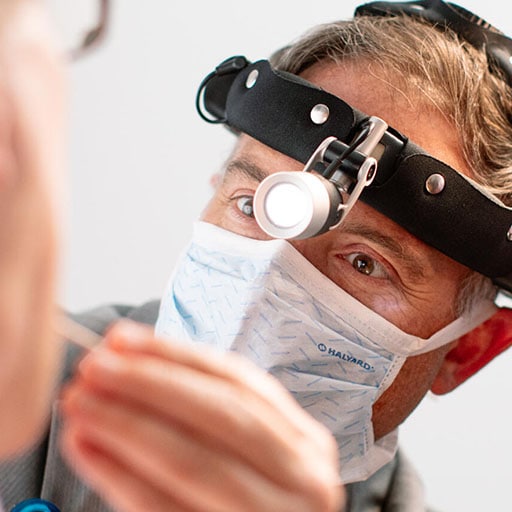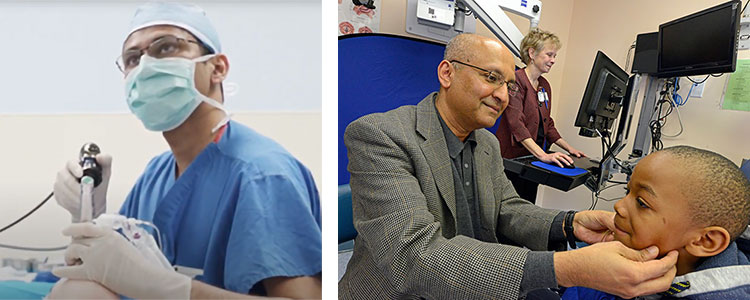Tired of Sinus Pain? Here's When to Call a Sinus Expert
Tired of Sinus Pain? Here's When to Call a Sinus Expert
Blog Article
Checking out the Field of Otolaryngology: What to Expect When You Speak With an ENT
Otolaryngology, generally described as ENT, includes the diagnosis and treatment of nose, ear, and throat disorders. For those experiencing related concerns, getting in touch with an ENT professional can offer clarity and alleviation. Comprehending what to expect throughout such examinations is vital for effective interaction and care. This summary will certainly detail essential facets of the ENT experience, including typical reasons for sees and the processes included in diagnosis and treatment.

Comprehending Otolaryngology: A Review
Otolaryngology, usually referred to as ENT (Nose, throat, and ear) medication, is a customized branch of medication that concentrates on the medical diagnosis and therapy of problems impacting these critical locations of the body. This area includes a large array of problems, consisting of those relevant to hearing, equilibrium, breathing feature, and speech. Otolaryngologists are trained to manage both medical and clinical therapies, utilizing innovative strategies and modern technologies. Their proficiency extends beyond traditional disorders, resolving problems such as allergies, sinus infections, and hearing loss. Additionally, they play a critical duty in the administration of head and neck cancers, offering comprehensive care customized to individual patient demands. Generally, otolaryngology stays important for maintaining wellness and top quality of life in affected individuals.
Typical Factors to See an ENT Expert
Lots of individuals look for the expertise of an ENT professional for a variety of reasons, mirroring the diverse nature of conditions that impact the nose, ear, and throat. Usual concerns include chronic sinusitis, which typically brings about relentless nasal blockage and face pain. Allergies and their connected signs and symptoms, such as sneezing and itching, also trigger visits to these professionals (Otolaryngologist). Hearing loss, whether unexpected or progressive, is an additional substantial factor for appointment. Additionally, individuals might look for evaluation for throat conditions, consisting of persistent hoarseness or swallowing difficulties. Rest apnea, defined by cut off breathing during sleep, is frequently attended to by ENT experts. Each of these conditions highlights the significance of specialized care in managing intricate ENT-related wellness concerns
Getting ready for Your ENT Visit
When preparing for an ENT consultation, it is important to collect appropriate information and take into consideration any kind of certain worries. People need to put together a comprehensive case history, including previous ear, nose, or throat concerns, surgical treatments, and current drugs. Documenting signs and symptoms-- such as severity, regularity, and period-- can offer important understandings for the ENT professional. In addition, people should prepare a checklist of concerns they desire to ask, making sure that all concerns are resolved during the visit. Bringing along any type of pertinent medical records or examination outcomes can even more aid the ENT in understanding the client's problem. Clients must validate their consultation information, consisting of date, time, and location, to minimize any last-minute confusion. Appropriate preparation can boost the performance of the assessment and result in much better end results.
What to Anticipate Throughout the Consultation
As the assessment begins, the patient can anticipate to involve in a comprehensive discussion with the ENT specialist about their symptoms and medical background. The specialist will ask about the period, regularity, and severity of signs and symptoms such as hearing loss, nasal blockage, or aching throat. Furthermore, the individual's previous medical conditions, medications, and any pertinent household history will be reviewed, aiding the professional in creating a total understanding of the client's health. The helpful resources ENT may also ask about way of living factors, such as direct exposure to irritants or irritants. This open dialogue develops a foundation for the assessment, making sure that the client's concerns are addressed and setting the stage for any kind of required analyses or suggestions for therapy.
Diagnostic Examinations and Procedures in Otolaryngology
A variety of diagnostic examinations and procedures are vital in otolaryngology to properly evaluate and identify conditions impacting the nose, throat, and ear. Common examinations consist of audiometry, which determines hearing function, and tympanometry, analyzing center ear pressure. Nasal endoscopy allows visualization of the nasal flows and sinuses, while laryngoscopy examines the throat and vocal cables. Imaging techniques, such as CT scans and MRIs, offer detailed views of head and neck structures. Allergy screening might also be performed to recognize triggers for sinus or respiratory problems. These diagnostic tools make it possible for ENT professionals to establish a comprehensive understanding of individuals' problems, ensuring tailored and efficient management strategies. Proper medical diagnosis is essential for successful treatment results in otolaryngology.
Therapy Alternatives Provided by ENT Specialists
ENT experts use a selection of treatment options tailored to attend to certain problems influencing the ear, nose, and throat. These treatments range from conservative methods, such as medicine and way of life adjustments, to more invasive procedures. Allergies may be managed with antihistamines or immunotherapy, while chronic sinus problems could require nasal corticosteroids or sinus surgical treatment. For hearing loss, ENT specialists frequently recommend hearing aids or medical treatments like cochlear implants. In situations of throat conditions, alternatives can consist of speech therapy or procedures to remove blockages. Additionally, anonymous they might give support for handling sleep apnea, consisting of using CPAP gadgets or surgical treatments. On the whole, the objective is to improve patients' top quality of life with customized care and effective therapy techniques.
When to Seek Follow-Up Treatment With an ENT
Acknowledging when to seek follow-up treatment with an ENT specialist is crucial for handling ongoing signs and symptoms or problems associated with throat, nose, and ear problems. Patients should take into consideration arranging a follow-up consultation if signs persist despite preliminary therapy, such as chronic ear discomfort, nasal blockage, or throat pain. Changes in hearing, equilibrium concerns, or unusual nasal discharge might additionally call for additional evaluation. Furthermore, if a person experiences adverse effects from recommended drugs or has gone through an operation, follow-up treatment is necessary to keep an eye on recuperation and address any type of worries. Prompt consultations can guarantee efficient administration of problems, protect against potential problems, and offer satisfaction pertaining to one's wellness. Looking for follow-up treatment advertises aggressive health management in otolaryngology.
Frequently Asked Questions

What Qualifications Should I Try to find in an ENT Specialist?
When looking for an ENT specialist, one must search for board qualification, relevant experience, and solid individual reviews. Furthermore, reliable communication skills and a caring method can considerably improve the overall treatment experience.
How Do I Pick the Right ENT for My Needs?
Choosing the ideal ENT specialist includes evaluating their certifications, experience, and patient evaluations (ENT Clinic). It is vital to consider their interaction style and method to therapy, guaranteeing they align with the individual's certain health needs and preferences
Exist Any Kind Of Threats Associated With ENT Procedures?
The risks connected with ENT treatments might consist of infection, blood loss, anesthetic complications, and prospective damage to surrounding structures. Individuals need to review these risks with their physician to understand private issues and assurance notified choices.
Exactly How Can I Handle Anxiousness Prior To My ENT Visit?
To handle stress and anxiety prior to a visit, people can practice deep breathing exercises, imagine positive results, prepare concerns in development, and seek support from pals or household, promoting a sense of confidence and peace.
What Should I Do if I Experience Adverse Effects From Treatment?
The individual should quickly report them to their healthcare copyright if side results from treatment take place. Changes to therapy or extra treatments may be necessary to assure safety and efficiency in managing their problem - Sinus. As the examination begins, the patient can anticipate to engage in a comprehensive conversation with the ENT specialist regarding their signs and symptoms and clinical history. These analysis tools enable ENT professionals to establish a detailed understanding of patients' problems, ensuring customized and efficient administration strategies. ENT experts nose balloon offer a selection of therapy options tailored to resolve certain conditions influencing the throat, ear, and nose. When looking for an ENT expert, one should look for board accreditation, relevant experience, and solid individual reviews. Selecting the right ENT professional includes evaluating their certifications, experience, and person testimonials
Report this page